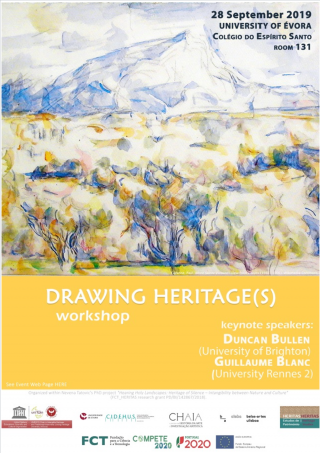Evento completo
28 Set
Interdisciplinary Workshop
"DRAWING HERITAGE(S)" - University of Évora

“Does the word landscape describe the mutual embeddedness and interconnectivity of self, body, knowledge and land; is it the world we are living in, or a scene we are looking at, from afar?”[1]
The question of John Wylie embodies the dilemma that's been perpetually pervading relationship between the artistic practice and landscape. In a realm of phenomenology, this is innately bounded to environmental perception and immersive, “lived” experience. With the drawing as an experience in itself taking place at the moment of immediate immersion in the landscape, with body, emotions and all the senses, this is an artists’ endeavour to tell their special way of “being-in-the world”[2], and at the same time, to ‘’make visible how the world touches us”[3].
- If the experience of landscape exceeds the mere gazing to envelope all senses to the point where the boundaries of the inside and the outside blur, what are the implications of this when applied to drawing heritage elements of the landscape?
- How do we get to know one landscape by drawing that landscape?
- How can we use that experience to better understand and articulate its heritage values, especially intangible?
Reflecting from the perspective of humans’ ambiguous bond to heritage and environment, the workshop aims to bring together scholars and artists to ponder critically on the possibilities of drawing as a form of visual inquiry in researching landscape and heritage. With a goal to deepen the interdisciplinary debate, it joins the theoretical and methodological approaches from several fields of study.
In the afternoon, the debate shifts outdoors, in a field trip to the selected heritage site where the audience will join speakers for drawing in situ experience.
The workshop welcomes students, as well as artists, researchers and professionals from the related fields. Participation is free of charge, but is subject to registration. To register and learn more details, please visit the web page of the event in: https://drawingstillplaces.wixsite.com/dsp1/drawing-heritage-s.
Orgainizing Committee: Nevena Tatovic, Shajjad Hossain, Monalisa Maharjan.
The event is organised in the methodological framework of Nevena Tatovic's PhD project "Hearing Holy Landscapes: Heritage of Silence – Intangibility between Nature and Culture" (FCT - HERITAS PD/BI/142867/2018).
With a support of:
UNESCO Chair in Intangible Heritage and Traditional Know – How: Linking Heritage,
CIDEHUS - Interdisciplinary Centre for History, Cultures and Societies and
CHAIA - Centre for Art History and Art Research of the University of Évora.
Heritage Studies Program - [Ref.ª: PD/00297/2013] - FCT]
___
[1] Wylie, J. (2007). Landscape. London: Routledge, p. 1.
[2] Merleau-Ponty, M. (2012). Phenomenology of perception (DA Landes, Trans.). Hoboken: Taylor and Francis.
[3] Merleau-Ponty, M. (1969). Cezanne’s Doubt. In The Essential Writings of Merleau-Ponty, by Maurice Merleau-Ponty, 9–25. New York: Harcourt, Brace and World, p. 19.
Organização: CIDEHUS - UÉvora | Cátedra UNESCO em Património Imaterial da UÉvora | Heritage Studies [Ref.ª: PD/00297/2013] - FCT]
All information: https://drawingstillplaces.wixsite.com/dsp1/drawing-heritage-s.






